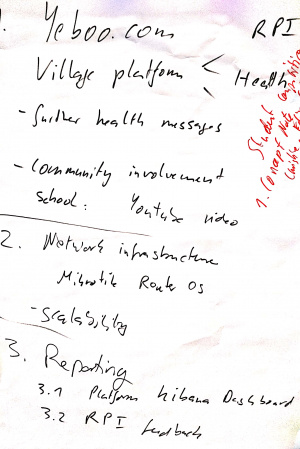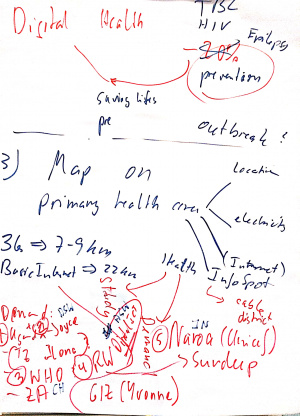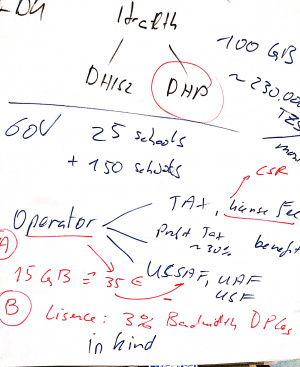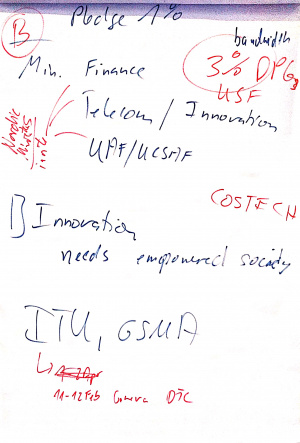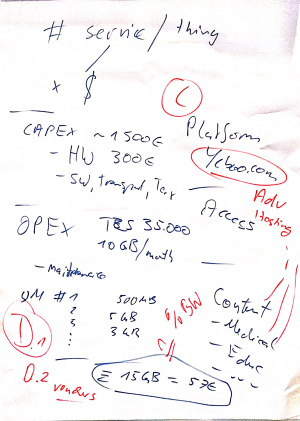DigI:DigI Arusha Meeting Nov19
From its-wiki.no
| Digital Inclusion (DigI) | |||||||
|---|---|---|---|---|---|---|---|
|
DigI:DigI Arusha Meeting Nov19
| Title | DigI Arusha Meeting (November 2019) |
|---|---|
| Place | African Tulip @Arusha |
| Date, Time | 2019/11/29, - 30Nov2019 |
| Contact Person | Christine Holst, Wisam Ahmed Mansour |
| Participants | Josef Noll, Christine Holst, Catherine R. Kimambo, Felix Sukums, Ernest Nyoni, Bernard Ngowi, Andrea Winkler, Helena Ngowi, Erwan Le Quentrec, Flora Francis Kajuna, Stefania Rubrichi |
| related to Project | DigI:DigI |
| Keywords |
| this page was created by Special:FormEdit/Meeting, and can be edited by Special:FormEdit/Meeting/DigI:DigI Arusha Meeting Nov19 |
| Category:Meeting |
Venue
for venue information, see https://www.theafricantulip.com/
Participants
Catherine, Felix, Flora, Beda, Bernard, Ernest, Andrea, Helena, Erwan, Stefania, Josef, Christine
Agenda
DigI Reception Thursday 28.11 at 19.00 @ African Tulip
1. Day
Meeting room 1st floor, African Tulip
- 09:00 Welcome
- 09:10 Table Round - State-of-the-Union - Status of DigI project and Specific plans per partner
- 10:15 Plenary discussion:
- "DIY - do it yourself" invitation to villages
- Implementation in Kimande / Idodi after May (last follow-up)
- 11:15 Break
- 11:30 talk about "lessons learned" for bringing health messages out (TV vs tablet)
- 13.00 Lunch (Josef travelling to Patandi)
: 14:00 - 15:30 Paralell sessions
Health team discussion on fieldwork and progress
- Launch party in Migoli / Izazi
- How to increase use of the animations and village platform in in the intervention villages
- Fieldwork Flora & Christine
- Next follow up: Feb & May
- Qualitative round in February
IT /Tech team discussion on
- Data bundle for a village,
- Vouchers system and updating/maintenance -- voucher testing
- Local technical support
- Village server content updating, maintenance, and hosting
- Replacement of equipment
- Tanzanian DHL // TZ gov and taxes
- 15.30 Break
- 15.45 Plenary session
- Sustainability and business model
- contacts, ; UCSAF, COSTEC contacts (ministry of Science and technology), Vodacome, Tigo,
- WHS Uganda Digital Health
- ECOSOC (UN)
- GSMA
- Publications
- DPGs
- 17:30 Closing of the meeting
- Dinner
2. Day
- 08.00 Departure from Arusha to Selela
- 1030 Arrival Selela
- Hot-spot Selela and Esilalei
- 1330 Departure Selela
- (Josef departure 18:10h Kili airport)
to take with us:
- 2 hot-spots for Migoli
- 2 sets for Esilalei og Selela (RPI + 952 configured), 1 tablet each - battery charger for Esilalei
Notes
Spesific plans per partner
- Josef: collaborating parters, see meeting list, DPG and DTC.
- Christine: Newsletter b4 christmas, fieldwork Feb & May - depending on the web platform being up and running, analysis, publications, and assisting implementation in Kimande and Idodi.
- Cathrine: several spots in Mkuranga District.Partner NMB microfinance. Educationsl package. Entrepreneur groups. Information desk at secondary schools.
- Helena, Flora and Beda: Floras research. Blood samples taken. fieldwork - depending on the web platform being up and running, then evaluation post intervention.
- Felix: Establishing a group for knowledge and capasity transfer, in Iringa? Should be trained for rolling out in Kimande and Idodi.
- Bernard: Sending Msangi and Nyoni out to the field to make sure that the ""web platform is up and running
- Erwan: Feb 15th, system up and running in Mali. Building proposal for USAID in Sierra Leone, renewable energy. Osean, clean water.
Health team agreements Nyoni and Misangi are travelling to Iringa asap, to ensure that the hotspots are up and running. The will bring the following:
- 2 screens to be installed with memory cards showing the animations in loop
- 1 projector for the school in Nyerere
If the hotspots are working out well, Nyoni will create the launch party and create visibility among the newly elected sub-village leaders.
Suggestions of sustainable models
- 1. operators : contract, five sim-cards, community pays for
- 2. Voucher on top of model 1
- 3. Advertisements on yeboo = payment
- 4. Provide connectivity, UCSAF pays
- 5. Licence condition, 3 % bandwidth
To be followed up:
- Msangi, Nyoni and Cathrine work together to ensure the hotspots functionnality.
- Bootcamp plans (Josef to draft concept note, Felix and Christine to set a date in the end of February and find a place in Iringa)
Plans for the Villages
- Raspberry Pi for Esilalei and Selela, Elibariki has received them - waiting for plans from Elibariki to connect further
- Migoli: send to hot-spots to the school
- Patandi: send an LTE antenna
see DigI:Villages
If you want to move fast, go alone - If you want to reach far, go together
The basis of the sustainable business operation is the Partnership for Digital Access.
Operation through Partnership
The project seeks for a partner operating the infrastructure. In case of an existing infrastructure, we would like to connect to the IP connection, and establish a Wifi distribution antenna and a network controller on the tower. If a village is not connected, we suggest to share the infrastructure costs for connecting the village, being either fibre, radio backbone, or a satellite link. l In case of a radio backbone, one might need to consider an autonomous repeater.
Common in both case would be the link from the village tower towards the health spot. Our piloted solution consists of an autonomous hot-spot, powered by a solar panel, and providing access to basic information (InfoInternet), being text, pictures and local video.
We primarily would like to get in partnership with an operator, here called OperatorX. We assume that OperatorX has a license to provide Internet (ISP), and is willing to share the costs of connecting the village. The distribution of responsibilities would in principle have the following items:
- OperatorX: Establishing the IP backbone to the village. The Basic Internet Foundation (BasicInternet) has technology providers who can provide equipment like backbone antennas, solar panels, batteries.
- OperatorX is in position of the license and takes the communication with the local and national authorities.
- OperatorX provides a place on the tower for the Wifi distribution and the local network control centre (NCC). The NCC might be located either on the tower or in the control room, and has a power requirement of less than 25 W.
- BasicInternet (or OperatorX) provides the local hotspot. See more details on the hot-spot infrastructure based on the pilot installation at Kjeller
- BasicInternet provides the free access to text and pictures, as well as to the local information server (InfoInternet). The free access to text and pictures will not exceed 2,5% of the available backbone bandwidth, thus backbone costs will be neglectable.
- BasicInternet provies the accounting for the IP infrastructure, being the time- and/or amount-based accounting, voucher generation and related topics. Typical scenarios are 1 hour, 1 day, 1 month access, 100, 500 MByte, 1 GByte data volume, or any combination of time an data volume.
Sustainability of operation is envisaged such that OperatorX provides a maximum of 2,5% of the available bandwidth, and BasicInternet providers the accounting functionality for the IP-network. Details of such an arrangement are basis for negotiations.
Operation by the Basic Internet Foundation
In case we don't find an operator, the Project has to run the infrastructure. However, in this case several issues have to be addressed
- License or license exempt. Our infrastructure is based on operation in the licence exempt band of 2.4 and 5.x GHz, the so-called industrial, scientific and medical (ISM)-bands. Operations in these bands don't require a license.
However, the local authorities, e.g. Tanzania Communication Regulatory Authority (TCRA), should be contacted to clarify
- License as Internet Service Provider (ISP). Country-specific regulations are most probably in place for ISPs. These regulations can either be linked to the form of the company, or the transmission of operation. In order to operate in a country, we will always seek for local partnership with an ISP. However, if only health or educational content is provided, the Basic Internet Foundation might be able to negotiate directly with the government.

